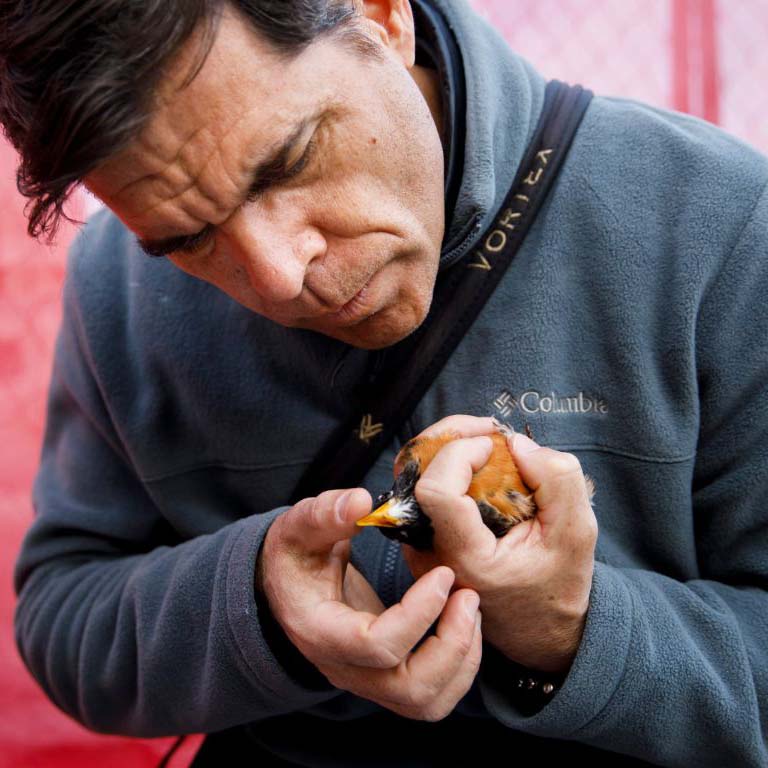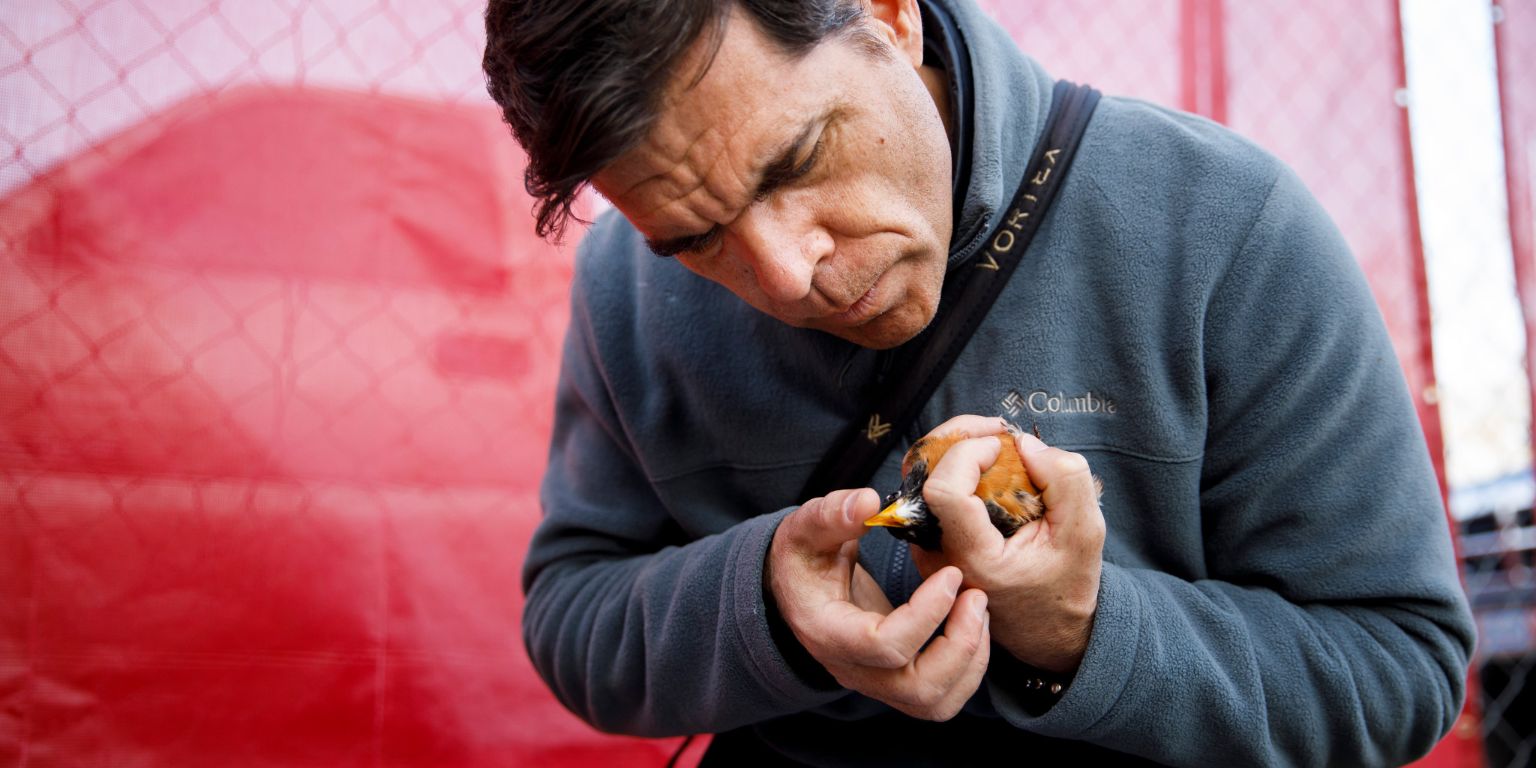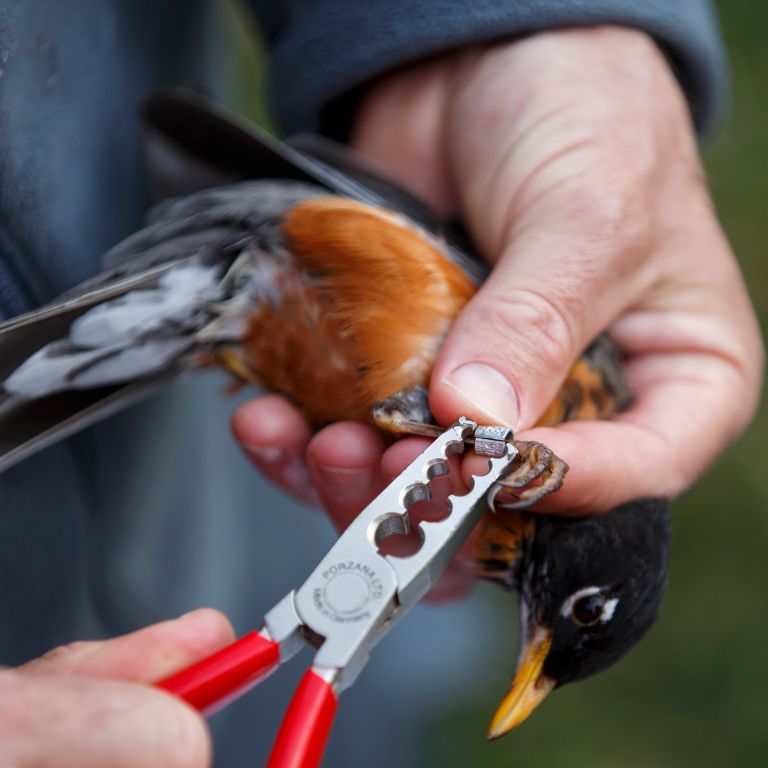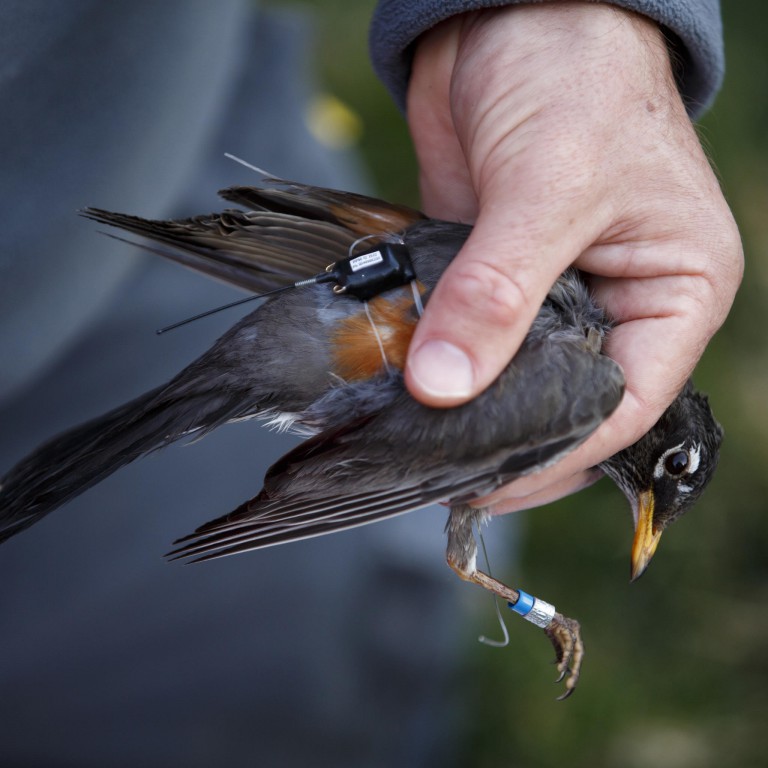Video transcript for 'Meet the Indiana University Environmental Resilience Institute's research fellows'
[Video: An aerial shot of the Indiana University campus]
[Words appear: Indiana University Presents]
[Video: Alex Jahn shown seated in a lab addressing someone off screen]
[Words appear: Alex Jahn, Environmental Resilience Institute Research Fellow]
Jahn: We know that change is coming. There's a lot of indicators from across the nation. It's not just going to be wildfires in California and hurricanes on the East Coast. The Midwest is changing quickly.
[Video: Jahn walking on the Indiana University campus and working with a bird caught in a net]
Jahn: As that climate changes and as urbanization changes in the Midwest, understanding the changes that we're experiencing right now is going to be invaluable for future planning.
[Video: Andrea Webster shown seated in a conference room addressing someone off screen]
[Words appear: Andrea Webster, Environmental Resilience Institute Implementation Manager]
Webster: The more that we talk to people about it, the more that we publish news stories about it ...
[Video: A group of children are shown during a field trip at Kent Farm with Adam Fudickar and Dustin Brewer]
Webster: ... the more that we have our scientists engaging with school children, the more that people are going to start to understand ...
[Video: Fudickar interacts with children on the field trip]
Webster: ... how our lives are changing as a result.
[Video: Ranjan Muthukrishnan shown seated in a lab addressing someone off screen]
[Words appear: Ranjan Muthukrishnan, Environmental Resilience Institute Research Fellow]
Muthukrishnan: The Grand Challenge effort is really a statement of "we want to be having an effect on the world."
[Video: Tara Smiley and Danielle Peltier-Thompson working in a lab at Indiana University]
Smiley speaks in voiceover: The work we're doing with the Environmental Resilience Institute is ...
[Video: Smiley shown seated in a conference room addressing someone off screen]
[Words appear: Tara Smiley, Environmental Resilience Institute Research Fellow]
Smiley: ... really important for understanding change today and making forecasts for the future, so we can have ...
[Video: Smiley working with a bird feather under a microscope in a lab]
Smiley: ... more sustainable ecosystems, more sustainable farms.
[Video: Abigail Sullivan and Matthew Houser studying a map in the Environmental Resilience Institute, engaging in a discussion]
Muthukrishnan speaks in voiceover: With Abigail Sullivan and Matthew Houser, we're working a couple projects together to think about the spread of invasive species.
[Video: Muthukrishnan shown seated in a lab addressing someone off screen]
Muthukrishnan: Protecting our water quality is, you know, primary to human health.
[Video: Shows a scene from a lake]
Muthukrishnan speaks in voiceover: A lot of these native aquatic plants in these ecosystems, they actually do part of the work of water treatment for us.
[Video: Ducks stepping into the lake]
Muthukrishnan speaks in voiceover: The more work that the natural ecosystem does on its own, the less work that we have to do to add to that.
[Video: Fudickar and Brewer walking on the Indiana University campus, preparing their research setup]
Fudickar speaks in voiceover: The animals that we're studying are in people's backyards.
[Video: Fudickar and Brewer setting up a net]
Fudickar speaks in voiceover: The data that we're generating can help inform people that those animals that they've observed ever since they were kids in Indiana ...
[Video: Fudicker shown seated in an office addressing someone off screen]
[Words appear: Adam Fudickar, Environmental Resilience Institute Research Fellow]
Fudicker: ... that we are impacting their populations ...
[Video: Fudickar and Brewer working to place a tracker on a bird]
Fudicker speaks in voiceover: ... and there are potentially ways to lessen our impact on them. We are putting little accelerometers on song sparrows.
[Video: zooms in on an accelerometer on the song sparrow]
Fudicker: Accelerometers, we developed with ...
[Video: Fudicker shown seated in an office addressing someone off screen]
Fudicker: ... a computer science faculty member here at IU ...
[Video: Fudickar and Brewer working in a field on the Indiana University campus, places a tracker on a sparrow's leg]
Fudicker speaks in voiceover: ... and we think that that's going to provide insight into identifying ways ...
[Video: Fudicker shown sitting on the ground outside, speaking to someone off camera]
Fudicker: ... to mitigate the impacts of future urbanization ...
[Video: Fudicker and Brewer shown working on the Indiana University campus]
Fudicker: ... on other animal populations.
[Video: Aerial shot of Indiana University campus]
Jahn speaks in voiceover: So what we're trying to figure out is where do individual ...
[Video: Jahn shown working with birds on the Indiana University campus]
Jahn speaks in voiceover: ... robins go to spend the winter, and how's that changing with climate change and habitat change and urbanization?
[Video: Jahn and Susan Reed working with a robin at a table, adding a tracker to a bird]
Jahn speaks in voiceover: With that information, we'll be armed with data on ...
[Video: Jahn shown seated in a lab addressing someone off screen]
Jahn: ... their potential to transport diseases, such as Lyme.
[Video: Jahn on the Indiana University campus, releasing the robin into a bush]
Jahn: All right, come back next year.
[Video: Smiley shown seated in a conference room addressing someone off screen]:
Smiley: I've never been part of something that's taking this really holistic view of environmental change ...
[Video: Smiley in the lab looking in a microscope]
Smiley speaks in voiceover: ... and its impact on society.
[Jahn in the field, walking with a bird in his hand]
Fudickar speaks in a voiceover: We only have one planet ...
[Video: Jahn releases the bird]
Fudicker speaks in voiceover: ... and we only have one Indiana.
[Video: Closeup of bird in a woman's hand; the bird then flies away]
Fudicker speaks in voiceover: If we value nature, then we ...
[Video: Fudicker shown seated in an office addressing someone off screen]
Fudicker: ... can work towards identifying ways to lessen ...
[Video: Jahn on the Indiana University campus with a bird in his hand]
Fudicker: ... our impact in the future.
[Screen fades to aerial of IU Bloomington's campus.]
[Words appear: Indiana University Grand Challenges Prepared for Environmental Change]
[Screen fades to black]




 The College of Arts
The College of Arts